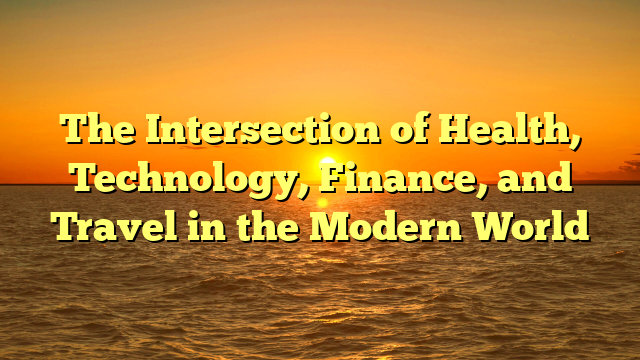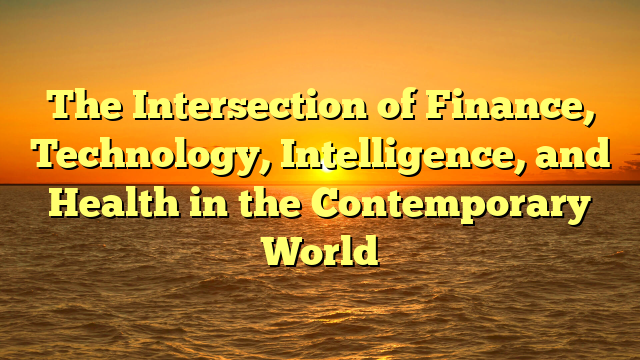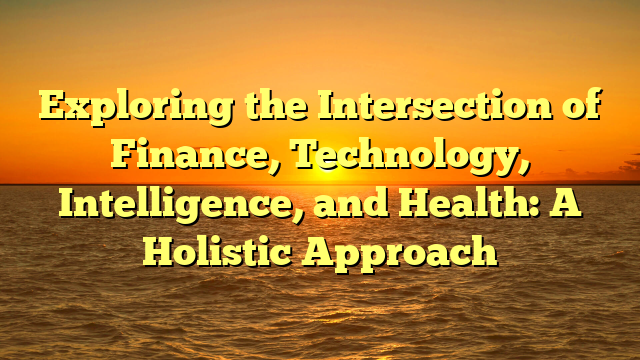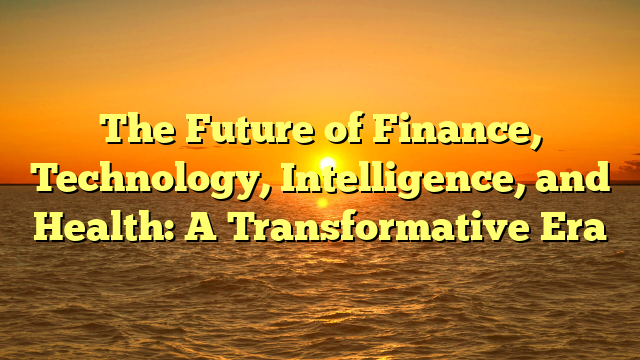
In the modern era, well-being is often seen as a priority for people, but it is increasingly being influenced by technology. With the rise of advanced gadgets, people are now able to monitor and maintain their fitness more effectively than ever before. At the same time, the financial industry is undergoing a digital transformation, with digital finance playing a key role in how individuals manage their wealth. Additionally, the way people travel has been fundamentally altered by advancements, and the intersection of these various fields is shaping a new world.
The Role of Technology in Health
Technology has revolutionized medicine, bringing about dramatic improvements in diagnosis, treatment, and prevention. With the introduction of wearables such as fitness trackers, smartwatches, and other health-monitoring gadgets, individuals can keep track of vital signs like heart rate, sleep patterns, and physical activity. These devices sync with software that provide insights and recommendations, helping users stay on top of their fitness goals.
Furthermore, the growth of virtual healthcare has made it easier for patients to consult doctors and specialists without leaving their homes. This is especially beneficial for those who live in remote areas or have mobility issues. Through video calls, people can receive medical advice, prescriptions, and even diagnoses from the comfort of their own homes, saving time for patients and healthcare professionals alike.
Another area where technology is making a significant impact is in the tailored treatments. With advances in genetics and genomics, researchers can now create treatments that are customized to a person’s unique genetic makeup. This results in more effective treatments and reduces the risk of side effects. In the future, it’s likely that medical interventions will become increasingly tailored to each individual, allowing for more targeted and efficient care.
How Technology is Changing the Finance Industry
The finance industry is also being transformed by innovation, particularly in the form of fintech. One of the most notable changes is the rise of digital wallets and online payment platforms such as PayPal, Venmo, and Apple Pay. These platforms have simplified the process of transferring money, paying bills, and making purchases, making financial transactions faster and more convenient.
In addition, blockchain technology is poised to revolutionize the financial world, offering decentralized systems that provide more security and transparency. Cryptocurrencies, such as Bitcoin and Ethereum, have emerged as an alternative to traditional currencies, offering a way for people to invest, trade, and store wealth in a decentralized manner. Although Bayar4D Alternatif of cryptocurrencies can be risky, they represent a new way of thinking about money and investment.
Moreover, the growth of robo-advisors has made investing more accessible to a wider audience. Robo-advisors are automated platforms that use algorithms to provide financial advice and manage investment portfolios. They offer a cost-effective alternative to traditional financial advisors, making it easier for people to start investing, even with limited funds.
Financial Literacy and Technology’s Role in Education
With the advent of online banking and investing platforms, financial literacy has become more crucial than ever. People now have access to a wealth of information and resources that can help them better understand personal finance, from budgeting to investing. Many financial apps provide educational content, tips, and personalized advice, helping users make more informed financial decisions.
Moreover, online courses and webinars are helping people learn about finance and manage their wealth more effectively. These tools have democratized financial knowledge, allowing individuals to make better decisions regarding their retirement, debts, and investments.
The Changing Landscape of Travel
Just as technology has affected health and finance, it has also had a profound impact on how people travel. In the past, planning a trip involved a great deal of research and paperwork, but with the rise of travel apps, booking flights, hotels, and activities has become easier than ever. Platforms like Airbnb, Booking.com, and Expedia allow travelers to plan their entire trip from the comfort of their smartphones.
Moreover, advancements in transportation technology have made travel faster and more efficient. The rise of electric vehicles (EVs) and autonomous vehicles has the potential to reduce the environmental impact of transportation while also making travel more convenient. Additionally, the advent of high-speed trains and hyperloop systems could further reduce travel time, making it easier to explore the world.
In terms of tailored experiences, technology is allowing travel companies to create experiences that cater to individual preferences. From AI-powered recommendations to virtual reality tours, travelers can now have a more customized experience. For instance, VR allows users to explore destinations before booking, helping them make more informed decisions about their trips.
The Future of Health, Technology, Finance, and Travel
Looking forward, the integration of health, technology, finance, and travel is likely to lead to a more interconnected world. For example, health data could be integrated with financial tools to help people manage the costs of medical treatments. Travel companies may offer health-focused travel packages that cater to wellness and medical tourism, where travelers can receive treatments while on vacation.
Moreover, the integration of artificial intelligence and data analytics across these industries could make services more personalized and efficient. In the healthcare industry, AI could be used to predict health risks based on genetic and lifestyle data, while in finance, algorithms may offer tailored investment strategies for individuals. Travel could become more sustainable and efficient, with smart technologies predicting optimal routes, booking systems, and even adjusting travel schedules to reduce carbon footprints.
Conclusion
In conclusion, the relationship between health, technology, finance, and travel is becoming increasingly intertwined. Technology is shaping all of these industries, making life more convenient, efficient, and accessible. Whether it’s through wearable health tech, digital banking tools, or personalized travel experiences, technology is enhancing our ability to manage our well-being, wealth, and travel in ways that were once unimaginable. As these fields continue to evolve, the future promises even more innovation, potentially improving lives on a global scale.





